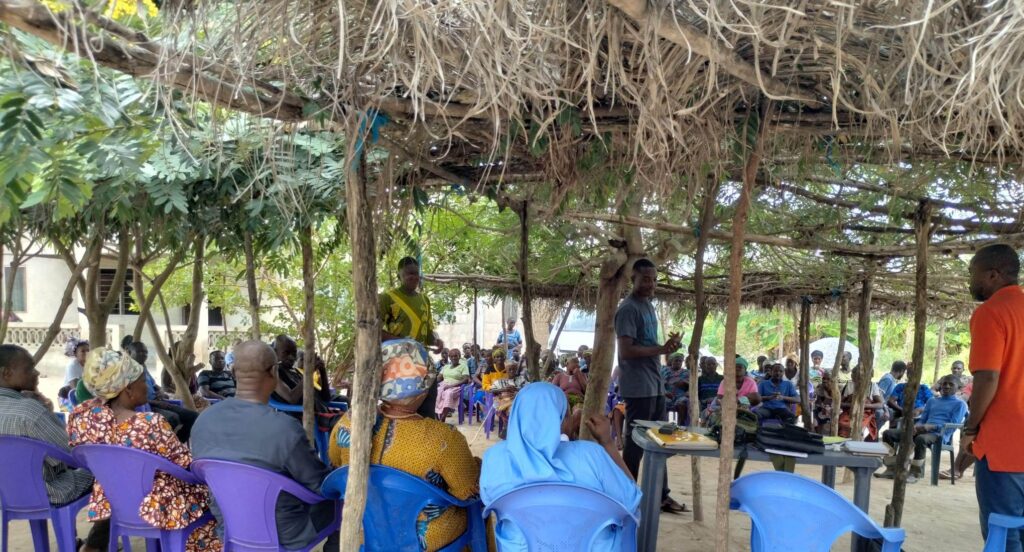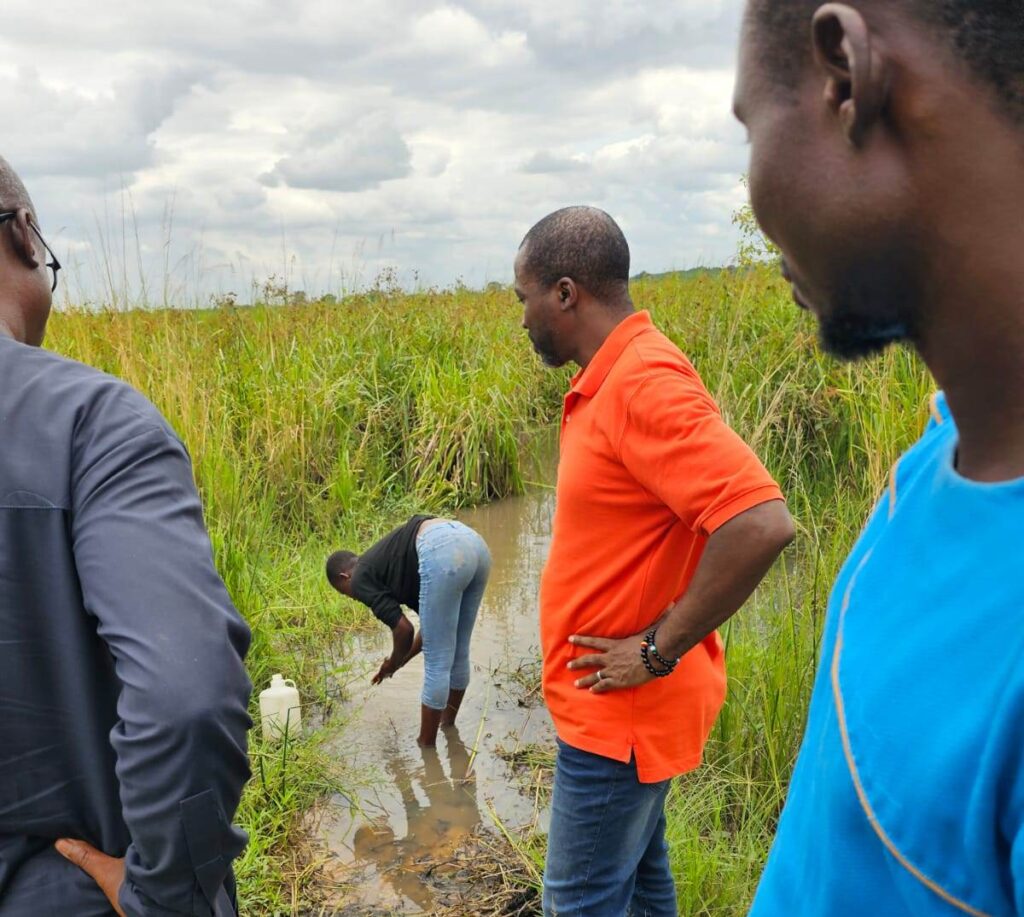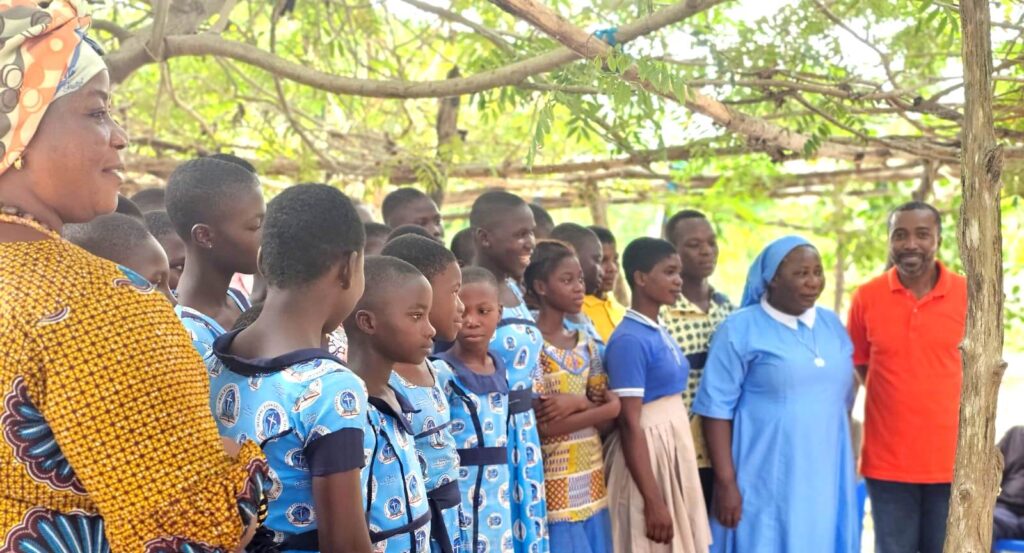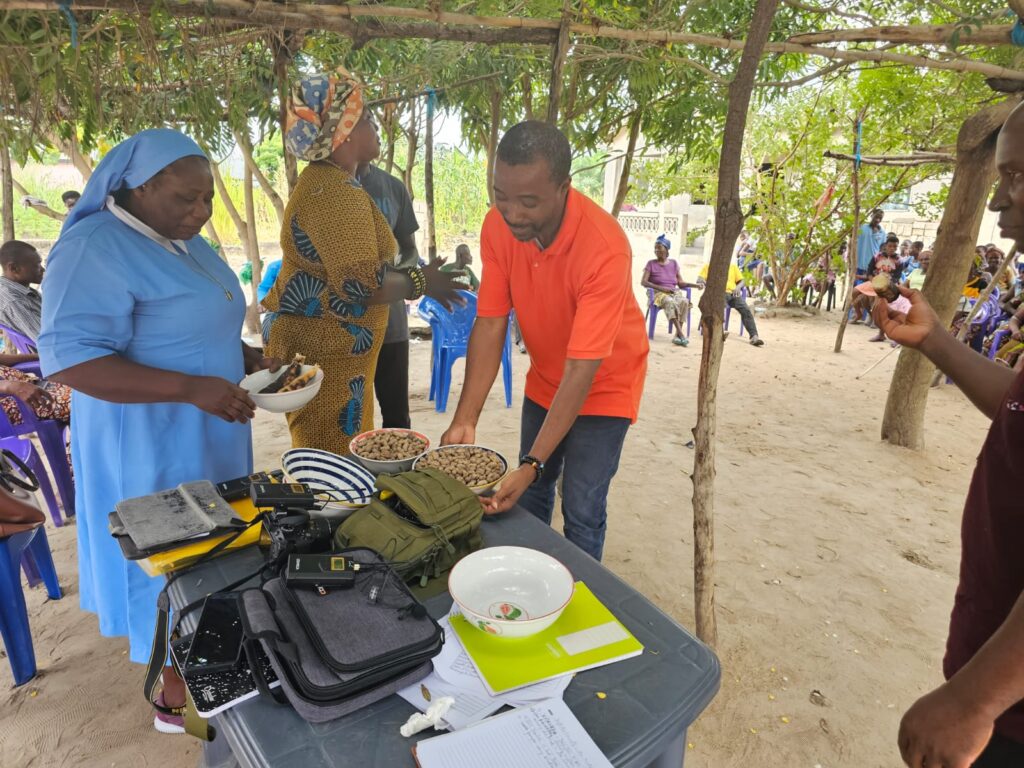
In August 2023, AFJN visited several communities in Ghana’s Volta Region as part of its land grabbing awareness and prevention program. Ghana is a burgeoning hotspot for large-scale land acquisitions (LSLA) in Africa as more than 8% of the country’s arable land has been acquired by foreign multinationals, according to Land Matrix. Driven by the notion of abundant land, foreign investors continue to focus on Ghana including Kanuwloe, a community in the North Tongu District of Ghana’s Volta Region. Kanuwloe is currently entangled in a complex web of land grab orchestrated by Harry Agri Company, an Indian-owned sugarcane plantation. Its population is estimated at 1500 (which often increases to as many as 4500 during festival times). But the rising demand for by-products of sugarcane (such as biofuel ethanol, rum,etc) has put tremendous strain on Kanuwloe’s limited land and water sources, exposing often-overlooked forms of appropriations driven by foreign land grabs. Like many other parts of Ghana, Kanuwloe’s tropical climatic conditions, coupled with the availability of arable land, make it ideal for large-scale sugarcane cultivation. However, this also creates opportunities for unscrupulous investors to capitalize on the international demand for sugarcane, often at the expense of rural communities. The village now hosts a thriving sugar cane plantation, thereby raising ongoing concerns about foreign encroachment not only on its farmland but also on its marshland swamp, which serves as the primary source of drinking water for both the community and its livestock. Monocropping and the use of toxic fertilizers pose a threat to indigenous crops and lead to the degradation of farmland and biodiversity both above and below the ground. The sugarcane plantation has also led to the contamination of the village’s only drinking water source, leading to allegations of outbreak in skin rashes and waterborne diseases. A total of six surrounding villages have also been adversely impacted by this incursion.
Informality plays an important role in making communities vulnerable to land grab. The gradual plowing of their farmland within the community by rogue investors and their enablers has left the community feeling helpless and uncertain about their future. The people of Kanuwloe say they have inhabited the land for more than a century. Yet, they are often considered “settlers” by other locals – a term that automatically strips them of their right to make decisions about the use of their land. This means they are usually not consulted on any land use decisions such as when the land is sold or negotiated. Therefore, the community only became aware of the situation when large ploughing machines suddenly showed up on their land.
Impact on Community

Kanuwloe now retains only a small portion of its once vast land, with adverse effects on water resources, food security and livestock grazing. The community’s sacred ancestral stone which served as the reservoir of drinkable water during drought was destroyed during the agricultural construction. Contaminated water sources have impacted their health. There has been an increase in incidents of malaria due to the sugar cane plantation serving as a breeding ground for mosquitoes. Lab results shared by residents showed abnormalities in their bloodstream which some attributed to drinking contaminated water. The community relies on firewood and charcoal as the main sources of energy and its livelihood. But community members are no longer allowed to fetch firewood on the land that now belongs to the sugarcane plantation. Moreover, the razing of trees and prevention of regrowth for the sole purpose of sugarcane monocropping has limited access to firewood and exacerbated other environmental problems. Vehicles used to plough and cultivate sugarcane have destroyed the roads making it very difficult for locals to transport their agricultural products to market and has restricted movement in and out of the community.
Impact on the Local School

The investors have not only destroyed the crops, but residents claim that they have also tried to destroy the only thriving school that serves six surrounding communities. The school was built by the International Needs organization as a deterrent to the harmful practices associated with the Trokosi.
Trokosi is a three-hundred-year old African religious practice in which family members, usually young virgin girls are given to the high priest of the faith to serve a lifetime sentence to expiate for a crime committed by a relative. These girls are subjected to sexual enslavement. The belief is that allowing offenses to go unpunished would bring calamities and vengeance upon the entire community. The introduction of Christianity countered some of the influence of the Atigo god, and it is believed that years without practice may have diminished the power of the community’s protective deity ( See link for a more detailed description of this practice “Inquiry into the Continued Practice of Trokosi (Indentured Servitude) in Ghana: An Outlawed Culturo-Religious Practice”)
Unfortunately, this school which served as a deterrent against enslaving young girls is currently under the threat of destruction. Some community members now express remorse for abandoning their traditional deity which they believe has left their land and community vulnerable to various threats. Although the actual practice of the tradition has ceased in Kanuwloe, the belief in its power remains robust. While the Trokosi cultural practice has contributed to the maintenance of law and order in the past, its resuscitation also risks bringing back the subjugation of young women to sex slavery in the absence of a formal education system.
AFJN’s Advocacy and its Implications

Dismantling the structures that keep vulnerable people in poverty is at the core of AFJN’s land grabbing awareness and prevention work in Ghana. AFJN’s advocacy in Kanuwloe sheds light on the broader implications of foreign land acquisition on vulnerable rural communities in Ghana. Like many villages in the Volta Region of Ghana, Kanuwloe stands at a critical juncture where human rights, education, and livelihood intersect. The experiences of Kanuwloe has the potential to spread to other townships with similar or other vulnerabilities. But awareness and community mobilization by AFJN continues to shed light on the issue and raises people’s consciousness to the value of their land for current and future generations. AFJN’s community engagement and advocacy is geared towards empowering the inhabitants of these vulnerable rural communities, and reversing the accelerated land grabs for these affected communities. Through AFJN’s work, awareness has been raised in several communities in Ghana over the years. With support from our members, grantors and local partners, AFJN’s advocacy continues to play a crucial role in reversing the risk that undermines domestic efforts in increasing food production and food security for Africa’s vulnerable.
